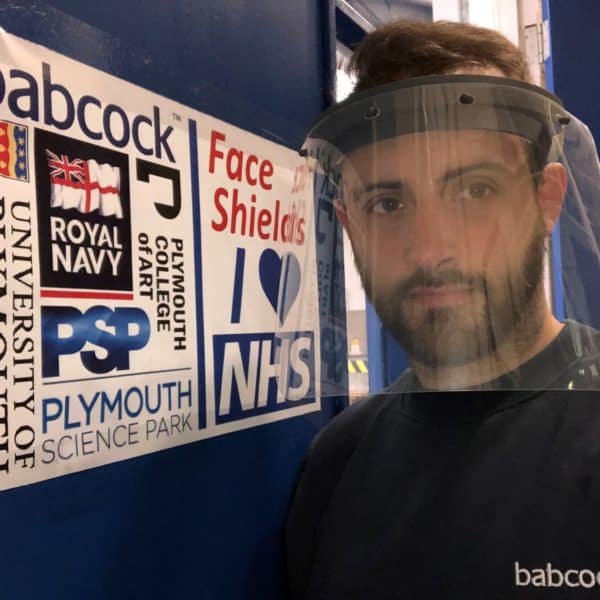14 Apr 2020
Plymouth consortium works to protect frontline staff during COVID-19 crisis

Babcock has teamed up with businesses from across Plymouth to provide 3D-printed face shields to frontline key workers dealing with the COVID-19 pandemic.
Alongside Plymouth Science Park, the University of Plymouth, Plymouth College of Art, the Royal Navy and independent 3D printing enthusiasts, the DST team is coordinating the local effort, using state-of-the-art technology to create components for the face shields.
Once assembled, the products are being delivered to staff working across the city, in the hope that they will help lower their risk of infection when attending people who might be affected by the virus.
In just over a week from the point the initiative was mobilised, the first deliveries of hundreds of face shields were printed and dispatched to key workers, with similar amounts now scheduled to follow each day.
Andrew McMinn, Chief Procurement Officer at University Hospitals Plymouth NHS Trust, said: “This situation is unprecedented, but has led to amazing shows of community support for all frontline health and social care staff. The equipment donated by this consortium will be distributed to GPs, care homes and police across Plymouth and help to protect them as they go about their vital work in our city.”
To support the city-wide initiative, hundreds of parts a day are being produced at Plymouth Science Park, in the University’s Digital Fabrication Laboratory, by Babcock’s Devonport Royal Dockyard’s DST Additive Manufacture Team, and in Plymouth College of Art’s Fab Lab, as well as other private facilities in and around the city. The Royal Navy also has a team of people who have this week started 3D printing in a workshop.
Babcock’s 3D Printing team, led by James Bye, Engineering Manager, are coordinating consortium efforts, with the staff at the various sites work on a rota basis to ensure they observe Government guidelines over social distancing. The open source components are then assembled and packaged by the team at CWEW and delivered to the NHS. In more normal circumstances the team uses its state-of-the-art 3D printing skills and technology to undertake rapid prototyping and parts manufacture in support of Ministry of Defence customers.
Mike Homer, Managing Director at Devonport Royal Dockyard, said: “This is a critical time for the country as a whole, and for the NHS in particular. Together the consortium have been able to react quickly, using our experience to deliver innovative solutions in support of the MOD, and we’re delighted to be able to work with the community to support the NHS to save lives.”
Whilst 3D printing offers a crucial and immediate solution to providing PPE for Critical Workers, the production process is slow compared with other manufacturing techniques, meaning it will not be able to meet the ongoing demand for face shields across all sectors. In response to this Babcock in Devonport has established a second project pursuing mass production of face shields using injection moulding production processes. This second project will take around 4 weeks to get into production, but once established will be able to produce thousands of face shields per day.